| Srl | Item |
| 1 |
ID:
159772
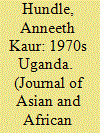

|
|
|
|
|
| Summary/Abstract |
This paper explores the ongoing presence of the 1972 expulsion of the racialized Asian population by former president Idi Amin in contemporary Uganda. The expulsion was a “critical event” and thus the paper uses an “anthropology of the event” approach to focus on the architecture of silence and historical consciousness of the event in urban Kampala. The four arenas of focus are: (1) official state narratives; (2) community mobilization and public forums on urban African-Asian relations; (3) memories, adventure tales, and narratives expressed by Ugandan Asian men; and (4) the infrastructure and material culture of 1970s Asian property expropriation.
|
|
|
|
|
|
|
|
|
|
|
|
|
|
|
|
| 2 |
ID:
159765
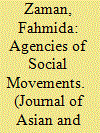

|
|
|
|
|
| Summary/Abstract |
This paper aims to address the emergence of parallel yet contradictory social movements in Bangladesh and explore the following question: what political factors in Bangladesh led to the emergence of these parallel movements? Unlike what social movements discourse has addressed, Bangladesh has seen the rise of two powerful and binary camps. To understand the growth of such conflicting movements, this paper hypothesizes that the framing of identity and ideology by the movement participants and the media have engendered the concurrent yet conflicting movements in Bangladesh. The paper focuses on how framing strategies led to ideological polarization between these movements.
|
|
|
|
|
|
|
|
|
|
|
|
|
|
|
|
| 3 |
ID:
159769
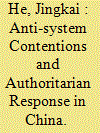

|
|
|
|
|
| Summary/Abstract |
This paper proposes a new framework to analyze social contentions in China from the perspectives of contention motives and mobilization channels, explains why traditional forms of contention do not undermine the Chinese Communist Party’s (CCP) rule, and identifies anti-system contention as a distinctive form of contention that poses the greatest challenge to the CCP’s rule. Through analysis of political opportunity structures and mobilization mechanisms that allowed anti-system contentions to rise, this paper argues that since such contentions mainly consist of value-oriented social actors mobilized via informal channels, it would require the Chinese regime to adapt to a more targeted and coordinated model of repression to address the new challenges. The paper further provides empirical case studies to show the effectiveness of the regime’s adaptive repression and shows that anti-system contentions in China face their own hurdle to develop into more prominent contentions.
|
|
|
|
|
|
|
|
|
|
|
|
|
|
|
|
| 4 |
ID:
159770


|
|
|
|
|
| Summary/Abstract |
Despite increasing interest in South Africa’s soft power in recent years, little analysis is offered on the factors that hinder the projection of such soft power. Most studies have focused on the sources and the optimization of South Africa’s soft power. While this article gives a synoptic account of these sources, it offers a different perspective by engaging the constraints and contradictions that hinder and circumscribe its soft power projection. The article concludes that, in order to maximize its soft power projection, Pretoria must address the impediments that continue to undermine its power of attraction.
|
|
|
|
|
|
|
|
|
|
|
|
|
|
|
|
| 5 |
ID:
159768
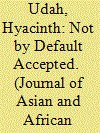

|
|
|
|
|
| Summary/Abstract |
In the face of the increasing migration of black Africans to Australia, this paper seeks to raise conversations about the meta-discourses of Otherness in the Australian society. The paper aims to provide insights into black Africans’ experience of othering and being othered in Australia. The paper draws from a broader study which examined the lived experiences of Africans in South East Queensland and highlights that the presentation of white as norm in Australia, one of or the institutional and social contexts that create conditions reinforcing othering practices, is perpetuated, especially, when the racial order in society is not acknowledged and challenged. The paper proposes that the condition of Africans in Australia may not just be explained by their immigration status or their lack of skills but linked to how they are positioned and constructed in Australia as visible ‘Others.’
|
|
|
|
|
|
|
|
|
|
|
|
|
|
|
|
| 6 |
ID:
159773


|
|
|
|
|
| Summary/Abstract |
Despite successive attempts to effectively manage Nigeria’s downstream oil sector by strengthening the country’s institutional capacity, the Nigerian public institutions remain ineffective, inefficient, wasteful, incapacitated, inept, unprofessional and uninspired to drive the reform in the downstream oil sector. Public institutions have failed to successively oversee management of the downstream oil sector. This paper draws on the new public management theory and unstructured interviews to assess the role of public institutions in the distribution and marketing segments of the oil sector. It concludes that poor public sector performance is responsible for the crisis in the oil industry that led to subsidy cuts and efforts to deregulate the downstream oil sector.
|
|
|
|
|
|
|
|
|
|
|
|
|
|
|
|
| 7 |
ID:
159771


|
|
|
|
|
| Summary/Abstract |
The ravines found along the Chambal River are among the most severe types of gully erosion found in semi-arid India. This paper estimates the extent and areal expansion of ravines over 40 years in the Lower Chambal Valley and provides a classification scheme to understand ravine characteristics in the region. To examine the implications of ravines on socioeconomic development and livelihoods of the people in the area, a mixed method approach has been followed. A combination of spatial and statistical tests has been run to examine the overall status of land degradation and its impact in the area concerned. Village-level socioeconomic data have been integrated with physical and environmental parameters in a GIS environment, which has been supplemented with findings from a qualitative survey in a few villages of the study region. The results show that there is a positive and significant relationship between indices of natural resources availability and socioeconomic development. A majority of villages within ravines were found to be very poor in development. In this fragile environment, people’s livelihoods are being adversely affected because of land degradation.
|
|
|
|
|
|
|
|
|
|
|
|
|
|
|
|
| 8 |
ID:
159766


|
|
|
|
|
| Summary/Abstract |
Chinese traditional culture is viewed to sustain political trust in the authoritarian regime. Given that Chinese cultural traditions are complex and multi-dimensional, it is ineffective to deal with this notion by a single index. This study divides Chinese traditional values into a non-political dimension (traditional family and social values) and a political dimension (traditional political values). Then, I empirically test how different dimensions of Chinese cultural traditions shape the ordinary people’s orientations toward their political institutions and government officials. The results show that the impact of traditional values on political trust varies by its different dimensions. Traditional political values and social values are positively correlated with both institutional trust and trust in government officials. Traditional family values are positively correlated with trust in government officials but do not have an effect on institutional trust. Liberal democratic values negatively correlate with trust in government officials, but this effect on institutional trust is not significant.
|
|
|
|
|
|
|
|
|
|
|
|
|
|
|
|
| 9 |
ID:
159767
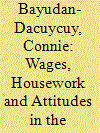

|
|
|
|
|
| Summary/Abstract |
This paper is one of the few studies that systematically analyzes housework in the Philippines. It seeks to understand how wages and attitudes to work and family life affect the time devoted to housework. Based on different specifications and estimators, our findings indicate that respondents’ own wages are not a significant predictor of the hours they spend on housework but that they are a significant predictor of the time spouses devote to non-market production. We find that husbands’ housework hours are positively affected by female respondents’ wages, while wives’ housework hours are negatively affected by male respondents’ wages. We turn to the Philippine context to explain these results and find the combination of egalitarian society and gender inequality in the labor market to be plausible explanations. Results also show that both wages and attitudes have direct effects on wives’ housework time but that some of the effects of wages are mediated by respondents’ attitudes toward gender roles.
|
|
|
|
|
|
|
|
|
|
|
|
|
|
|
|